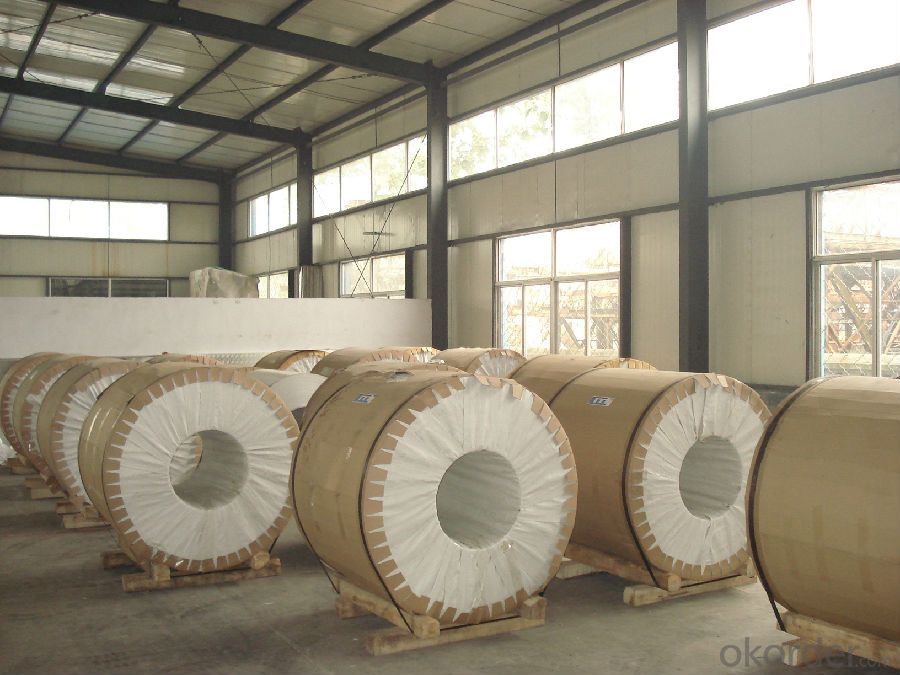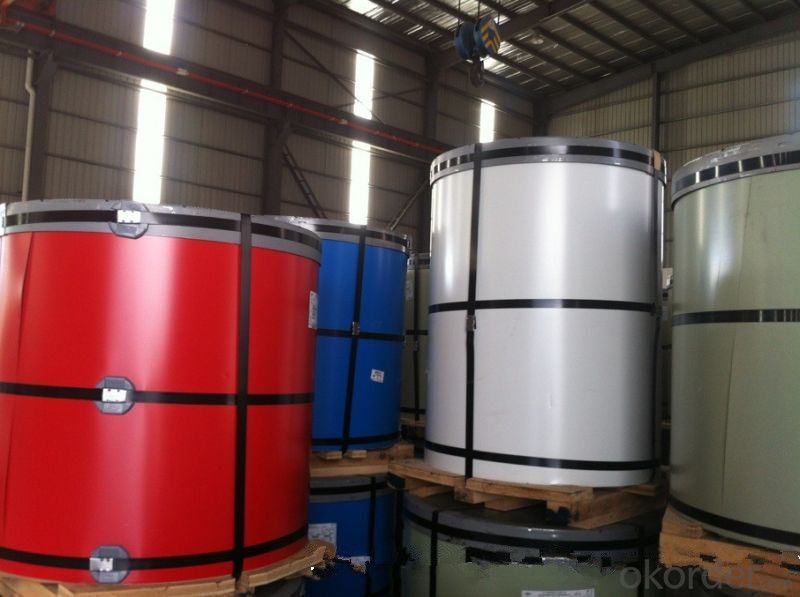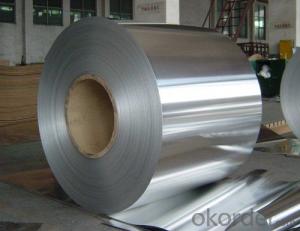PVDF Coated Aluminium Sheet For Solar Panels
- Loading Port:
- Shanghai
- Payment Terms:
- TT OR LC
- Min Order Qty:
- 1 m.t.
- Supply Capability:
- 60000 m.t./month
OKorder Service Pledge
OKorder Financial Service
You Might Also Like
Item specifice
PVDF Coated Aluminium Roll For Solar Panels
Specifications
Standard | GB/T3190-2008, GB/T3880-2006, ASTM B209, JIS H4000-2006 .etc |
Thickness | 0.2-8.0 mm aluminium 7075 t6 |
Width | 1250mm 1000mm 1219mm or as your requirements |
MOQ | 8 Ton |
Package | Standard export package, by wooden box or as required. |
Application | 1060 is widely used in the strength requirements of the product. Products commonly used in signs, billboards, building exterior decoration, bus body, high factory wall decoration, kitchen sink, lamp, fan, electronic components, chemical apparatus, sheet processing, deep drawing or spinning hollow ware, welding parts, heat exchangers, Bell surface and plate, plates, kitchen utensils, accessories, safety equipment and other. |
Characteristics
1) Excellent weather-proof durability
2) Anti-ultraviolet
3) High erosion resistance
4) Stable color and gloss
5) Good mechanical processing performance
6) Abrasion resistance
7) Anti-impact
8) High flexibility
Coating varieties
Polyester Coatings (PE)
PE (polyester) coatings exhibit an excellent combination of hardness, flexibility, flow, appearance, and superior resistance to dirt retention in indoor and outdoor applications. These coatings are highly resistant to abrasion, metal marking, staining, and marring, and require minimal maintenance. Glazetech uses polyester paints which provide excellent colour and gloss retention properties.
Polyvinylidene Fluoride Coatings (PVDF)
PVDF (polyvinylidene fluoride) is a chemical resistant thick film barrier coating commonly used in architectural applications where both excellent appearance and substrate protection must be maintained over a long period of time. This coating is unaffected by most chemicals and solvents and has excellent wear and abrasion resistance. PVDF also has a high dielectric strength, excellent resistance to weathering and the ability to self extinguish.


- Q:Can aluminum coils be customized to specific requirements?
- Yes, aluminum coils can be customized to specific requirements. Aluminum coils are highly versatile and can be tailored to meet a wide range of specifications and applications. Customization options include the choice of alloy, thickness, width, and length of the coil, as well as various surface treatments such as coatings, finishes, and embossing. Additionally, aluminum coils can be customized in terms of mechanical properties, such as strength, flexibility, and corrosion resistance, to suit specific needs. The customization process involves working closely with manufacturers or suppliers who have the expertise and facilities to meet the desired requirements. Whether it's for the aerospace industry, automotive sector, construction projects, or any other application, aluminum coils can be customized to meet specific requirements and deliver optimal performance.
- Q:This is for handling aluminum
- Aluminum as a solid is very safe; although non-nutritious (your body does not require it), its accumulation in tissues is apparently not directly harmful. Individuals who work years of their lives in handling aluminum have no higher incidence of Alzheimer's disease than those that do not. As a powder- particularly very fine powders- aluminum is extremely hazardous with respect to its combustibility, and is used in fireworks (sparklers, for example). When it burns, it is extremely hot, and extinguishing it should not be attempted without training and the correct tools- usually salt or Purple K extinguishing agent. However, it burns so quickly that it will usually be out before attempts can be made.
- Q:Can aluminum coils be used in the aerospace industry?
- Yes, aluminum coils can be used in the aerospace industry. Aluminum is widely used in the aerospace industry due to its lightweight, high strength, and good corrosion resistance properties. Aluminum coils are commonly used in various aerospace applications such as aircraft fuselage, wings, engine parts, and structural components.
- Q:How are aluminum coils tested for quality control?
- Aluminum coils are tested for quality control through various methods including visual inspection, dimensional checks, surface roughness analysis, mechanical property testing, and chemical composition analysis. These tests ensure that the coils meet the required specifications and standards, guaranteeing their quality and suitability for their intended applications.
- Q:Can aluminum coils withstand extreme temperatures?
- Aluminum coils have gained a reputation for their remarkable capability to endure extreme temperatures. With a melting point of 660.32°C (1220.58°F), aluminum proves to be an ideal material for tasks demanding heat resistance. HVAC systems, for instance, frequently employ aluminum coils that are exposed to both high and low temperatures. Similarly, automotive radiators rely on aluminum coils to withstand elevated operating temperatures. Moreover, the outstanding thermal conductivity of aluminum enables efficient heat transfer away from the coil, further bolstering its ability to withstand extreme temperatures. All in all, aluminum coils stand as a dependable and long-lasting option for applications that necessitate resistance to severe temperature conditions.
- Q:Are aluminum coils suitable for electrical transformers?
- Yes, aluminum coils are suitable for electrical transformers. They have several advantages, including lower cost, lighter weight, and better thermal conductivity compared to copper coils. Additionally, aluminum coils have been widely used in power transformers, demonstrating their suitability for this application.
- Q:We are working on a new aluminum fixture. It is basically an aluminum spine with many 6061-T6 pins sticking out. Currently we drill the holes inside the spine and hammer the 5/32 6061-T6 pins inside. Is there anyway to cast aluminum with many 6061-T6 pins embedded (they will stick out after the casting)?
- Casting aluminum is one of the least expensive ways to make metallic objects and with a little clean up work and polishing, the results are stunning and shine like the wings of the old WWII bombers. Cast aluminum melts at a hot but relatively low temperature and is easy to carve after you cast it.
- Q:Can aluminum coils be used in solar panel manufacturing?
- Yes, aluminum coils can be used in solar panel manufacturing. Aluminum is a lightweight and durable material that is commonly used in various industries, including the solar panel manufacturing industry. It is often chosen for its excellent thermal conductivity, corrosion resistance, and cost-effectiveness. Aluminum coils are typically used in the production of solar panels to create the frame or support structure for the photovoltaic cells. The coils are fabricated and shaped into the desired form, providing a strong and stable structure for the solar panel. Additionally, aluminum is also recyclable, making it an environmentally friendly choice for solar panel manufacturing.
- Q:The temperature of the water drops from 93.0°C to 78.0°C. What quantity of heat energy did the piece of aluminum absorb?
- The specific heat of Aluminum is 0.215 cal/g-°C. The calories absorbed (q) would be q = m * c * (T2 -T1) = 22.0 g * 0.215 cal/g-°C * (78.0 °C - 0.3 °C) If you have a different value for the Specific heat of Aluminum, use it in the formula for your calculations. If you knew the mass of the water, you could check your calculations because the heat gained by the Al would be equal to the heat lost by the water, using q = m * c * (T2 -T1), where m is the mass of the water, c = 1.00 calorie/gram °C, T2 = 78.0 °C and T1 = 93.0 °C. The sign of q will be negative.
- Q:Are there any specific guidelines for the handling of aluminum coils?
- Yes, there are specific guidelines for the handling of aluminum coils. Here are some key points to consider: 1. Proper lifting techniques: When handling aluminum coils, it is important to use appropriate lifting equipment such as cranes or forklifts. These tools should have the capacity to handle the weight of the coils to prevent accidents or damage. 2. Protective gear: Workers should wear personal protective equipment (PPE) such as gloves and safety goggles to protect themselves from sharp edges or potential injuries during handling. 3. Secure packaging: Aluminum coils should be stored or transported in secure packaging to prevent damage. This can include using suitable pallets, straps, or protective covers to ensure the coils are held in place and protected from external factors like moisture or impact. 4. Proper stacking: When storing or transporting aluminum coils, it is important to stack them in a way that ensures stability and prevents them from falling or causing accidents. Coils should be stacked evenly and securely, with adequate support and space between each stack to avoid deformation or damage. 5. Avoid contact with corrosive materials: Aluminum coils should not come into contact with corrosive materials such as acids or alkalis, as they can cause damage or corrosion to the metal. It is important to store aluminum coils in a clean and dry environment to preserve their quality. 6. Handling with care: Aluminum coils are susceptible to scratches, dents, and other damage, so they should be handled with care to avoid these issues. Avoid dragging or sliding the coils during handling and ensure that they are placed gently to prevent any potential damage. 7. Training and supervision: Workers involved in the handling of aluminum coils should be adequately trained and supervised to ensure they are following the specific guidelines and safety procedures. Regular training sessions can help refresh their knowledge and reinforce safe handling practices. Following these guidelines will help ensure the proper handling of aluminum coils, reducing the risk of accidents, damage, or loss of quality.
1. Manufacturer Overview |
|
|---|---|
| Location | |
| Year Established | |
| Annual Output Value | |
| Main Markets | |
| Company Certifications | |
2. Manufacturer Certificates |
|
|---|---|
| a) Certification Name | |
| Range | |
| Reference | |
| Validity Period | |
3. Manufacturer Capability |
|
|---|---|
| a)Trade Capacity | |
| Nearest Port | |
| Export Percentage | |
| No.of Employees in Trade Department | |
| Language Spoken: | |
| b)Factory Information | |
| Factory Size: | |
| No. of Production Lines | |
| Contract Manufacturing | |
| Product Price Range | |
Send your message to us
PVDF Coated Aluminium Sheet For Solar Panels
- Loading Port:
- Shanghai
- Payment Terms:
- TT OR LC
- Min Order Qty:
- 1 m.t.
- Supply Capability:
- 60000 m.t./month
OKorder Service Pledge
OKorder Financial Service
Similar products
New products
Hot products
Related keywords





























